Mass. House repeals "1913 Law" by 119-36 vote. Opens door to exporting "gay marriage" across America
See link below for roll call vote, and full text of speeches
July 30, 2008
Yesterday afternoon, despite widespread internal dissention and overwhelming negative outpouring from the public, the House leadership kept their promises to the homosexual lobby and forced a vote to repeal the "1913 Law". That law has prohibited homosexual couples (or anyone) to get "married" in Massachusetts if that marriage would be illegal in their home state. Now it looks like the doors will be open.
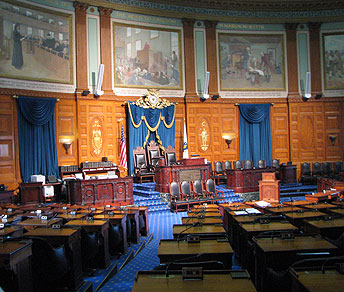 |
Scene of the crime. We took this shot of the empty House chambers while the reps were in "caucus" just before the debate and the vote. |
Bill S800 passed 119-36 on a roll call vote (including two who voted afterwards). The bill now goes to the Governor, who has promised to sign it into law.
S800 had been submitted and "killed" in a study earlier this year, thanks to a strong outpouring from MassResistance. But then this month the leadership suddenly brought it back.
The leadership of both houses had publicly promised the homosexual lobby to repeal this before the end of the session, July 31. But after the Senate passed it with a cowardly voice vote on July 15, public outrage erupted. It's generally agreed that outpouring against the bill came in at a 6-1 ratio. Newspaper reports indicated that lot of reps were very uncomfortable (we promised to remember their vote this November). Over the last few days the bill had been on the calendar but not taken up. And Monday evening, State House News reported that MassResistance had spoken to reps who guaranteed a voice vote would be demanded in the House. Finally, on Tuesday the leadership put their foot down and forced the issue.
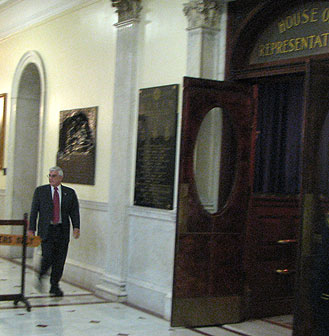 |
Rep. Paul Donato (D-Medford) walks toward House chambers to enter session. The liberals like Donato more and more, as he abandons his former pro-family principles. |
Right before taking it up, the House Democrats met in a caucus for over an hour. Then, during the proceedings, Mass. Gay and Lesbian Political Caucus lobbyist Bill Conley stationed himself at the door to "remind" any reps coming or going that the gays were watching. Nevertheless, unlike in the Senate there was unabashed, bipartisan, and very public objections and criticism of the bill during debate.
Here's what happened: blow by blow
Immediately, Rep. Brad Jones (R-North Reading), the Republican minority leader, stood up and asked for a roll call vote. There was enough support, and it was granted. (Interestingly, Jones eventually voted for the repeal.)
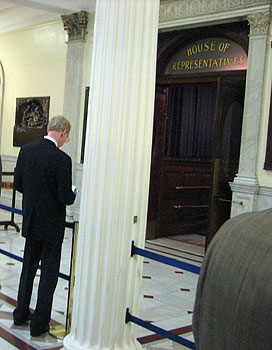 |
Indimidation factor. During the session, homosexual lobbyist Bill Conley stood outside the entrance to the chambers so anyone entering or leaving could clearly see he was watching them. |
Then there was debate. Seven reps stood up and spoke - 4 supporting and 3 opposing. Here's a synopsis of what they said:
-
Byron Rushing (D-Boston), for the repeal, was the point person for this in the House, like Diane Wilkerson in the Senate. He gave a fairly rambling talk. He tried to claim that the law had never been enforced, so it was not "fair" do so now. He said it was probably racist in origin, but he admitted there wasn't a direct link -- not the strong emotional argument we heard in the Senate. Rushing addressed the flood of MassResistance messages everyone's been getting: "There's been a considerable amount of misinformation distributed to us over the past several weeks," he said. And again he referred to "lots of emails" that the legislators have been receiving.
-
John Lepper (R-Attleboro) in opposition, described the legal havoc this will cause other states. States don't want this kind of meddling, he said and brougt up the fact that since the Goodridge decision 37 states have passed amendments banning same-sex "marriage". Lepper described the Goodridge decision as a violation of the separation of powers."
-
Paul Loscocco (R-Holliston) spoke for the repeal. Loscocco , who flipped against us at the last minute in the Amendment vote, loves to fancy himself as a serious thinker. But his speech in support of the bill was pretty dumb. Being able to cause havoc in different states is a good thing, he argued, because of the "laboratory of ideas" it brings. Plus, not repealing this law would be "patently offensive to same-sex couples". (Well, we certainly wouldn't want to offend them!) Note: MassEquality did a fundraiser for Loscocco several months ago.
-
Vinnie deMacedo (R-Plymouth), against the repeal, brought up an excellent point - that even the Mass. Supreme Judicial Court, in recent decisions, has officially rejected the idea that the 1913 law was passed for racist reasons. That should put that canard to bed for good.
-
Alice Wolf (D-Cambridge), for the repeal, who is slightly to the left of Castro on most issues, tried the old emotional approach. She talked about a lesbian friend living out of state who couldn't come home to marry her female lover, and how sad it is.
-
Mary Rogeness (R-Longmeadow), against the repeal, gave a pretty good speech about how the current law is necessary for other reasons. For example, Massachusetts has no minimum age for marrying (with parents' consent) but other states do.
-
Robert Spellane (D-Worcester), for the repeal, gave probably the stupidest speech. He claimed that the current law is unconstitutional (without citing any reasons) and added that "gay and lesbian families have been discriminated against by [this] outdated law" which must be repealed.
See full text of speeches below.
At that point, no more speakers came forth. So they voted.
The roll-call vote
Then the vote was taken. It was 119-36. There were a few surprises. Six reps who had voted with us on the Constitutional Amendment last year, now flipped and voted to repeal: Sean Curran, Paul Donato, Jeffrey Perry, Joyce Spiliotis, David Nangle, and Linda Dean Campbell. And three reps who had been against the amendment supported us in this vote: Joseph Driscoll, Angelo Puppolo, and Joseph Wagner.
See the entire roll call vote HERE
Rep. Paul Donato (D-Medford), who had been so outspoken about not wanting this vote to take place, in the end decided to completely abandon his pro-family past and side with the gay lobby, which has been breathing down his neck back in his district. Jeffrey Perry (D-Sandwich) also continues his move to the anti-family side. This morning, the "pro-family" Rep. Perry had his picture in the Boston Globe along with the quote, "The only responsible thing to do would be to repeal it and get it off our books." Thanks a lot, Jeff.
Both Donato and Perry had been co-sponsors of the new Parents' Rights Bill, and now they both oppose it (we've had communications with both of them on this).
The House and Senate Republican leaders - Sen. Richard Tisei and Rep. Brad Jones (and Rep. Brad Hill) - publicly supported the repeal.
After the vote, outside the House chamber, there was a noticable lack of excitement. |
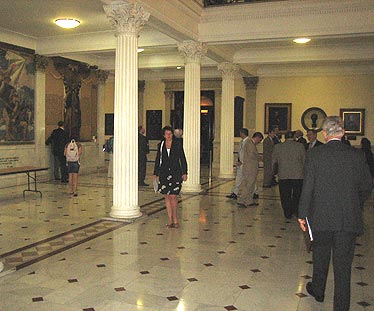 |
Subdued reaction at the State House afterwards
Compared to the near pandemonium after the Senate vote on July 15, after this vote things were quite subdued. We saw only one TV camera and just a few reporters. The big MassEquality honchos were nowhere in sight. The homosexual newspaper contingent was there and a smattering of left-wing groupies, but that was about it. It's as they were so bored with winning they didn't bother to come out and gloat.
Republican House Leader Brad Jones (R-North Reading), left, who voted for the repeal, calmly confers with colleagues in the hall after the vote. |
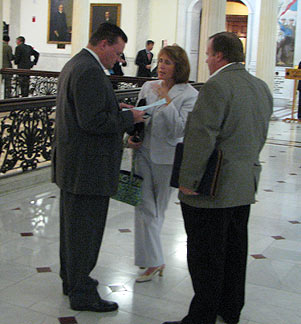 |
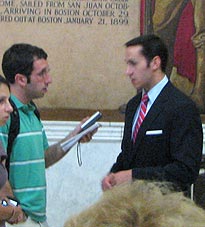 |
Reporter from homosexual newspaper Bay Windows (left) started getting quotes immediately after the vote. |
When state rep Carl Sciortino (D-Sodom and Gomorrah) saw us, he quickly turned around and bolted back into the House chamber. |
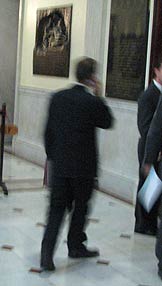 |
Text of speeches (from State House News Service)
Below is the text of the speeches (described above) during the debate, provided to MassResistance by State House News Service:
Speaker DiMasi banged the gavel and asked members to take their seats.
Rep. Jones requested a roll call and there was support.
Rep. Rushing of Boston said the issue before us is the repeal of the so called 1913 law. The law was chapter 360 of the Acts of 1913 and it said that Massachusetts would not perform any civil marriage ceremonies and grant any marriage licenses to couples whose members were from out of state and could not legally get married in their state. I am not sure how many people here who are not clerks knew that that law was on the books before 2004. I don't know how many people here knew people who came from out of state and got married here who in their own state could not get married. To my knowledge, unless a clerk became very specific in asking questions about the laws in those states, most of those people got married here. Few clerks asked the question of couples in the 1950s and 60s and 70s, can you marry this person in your own state? How is this person related to you? Is this person a cousin? Is this person a first cousin? Can you marry a first cousin in your state that you are coming from and have this nice marriage in the Berkshires? I am not sure we know the answer. Can you marry your first cousin in Massachusetts. The no's are wrong. You can. How many couples were asked that question? Except for a few people we did not think about this law. Then we had the Goodridge decision. People informed the governor of this law and suggested we enforce it for this new population that had not been before that been able to legally marry in this state, samesex couples. We had a law on the books that was not being enforced, reinvigorated. In its reinvigoration, we made clear that all clerks should ask samesex couples from out of state seeking a marriage license, they would be asked can you legally marry in your own state? Until a few weeks ago it was a rhetorical question. Many of us thought this law was unconstitutional and had it been raised earlier, the SJC might have agreed. That case did not go there until after Goodridge and the SJC ruled it was constitutional. This is a question of fairness and it is a question of equality. We have allowed people to marry in Massachusetts who could not legally marry in their own state for decades and now we want to change how we apply a law that we never enforced. It is a matter of equity. It is the manner of equity that I and you should know that your state will grant to anyone in this country what you and I can have in Massachusetts if that person comes to Massachusetts. That is the equity in the decision to repeal this law. Others will speak of this in terms of context and what we owe our citizens and visitors. Others will speak in terms of what might happen if a couple comes here, gets married and returns to a state where that marriage might not be considered legal. I end my remarks on one or two historical notes. There has been a considerable amount of misinformation distributed to us. The first issue I want to raise is uniform state laws. The law is on the books because there is an organization of the National Conference of Commissioners of Uniform State Laws and they came up with uniform state laws on marriage in 1912 and they urged all states to adopt that uniform set of laws on marriage and one of those laws was this law we are talking about, the law about not allowing marriage to people from out of state in a state that has different marriage rules. In 1913, this Legislature, our colleagues several generations removed, adopted that part of the uniform state marriage laws. There is a question about why they did this. It wasn't only race that was the concern but it certainly was a concern. More importantly for us is the fact that this organization which still exists, in 1970 repealed the whole 1912 report on marriage. Unfortunately in 1970 the Massachusetts Legislature was not paying attention. One word about this law and interracial marriage. There has been a considerable amount of email saying this law was not passed because of concern about interracial marriage. Well, sorry. There was a lot of concern about interracial marriage in this country around 1913. It became popular when Jack Johnson, an African American prizefighter, won the title and he had an outgoing personality and many did not think he acted in a way that African Americans who are successful should act. He seemed to have no humility. He married a white woman in 1910 and the moment he did the idea of interracial marriage became a huge popular debate. In mot of the United States, there were few laws against interracial marriage outside of the south. In 1913 ten states passed laws against interracial marriage. This was an issue being debated that people in this Legislature knew about. This Legislature was not moved to repeal that law so interracial marriage continued to be legal but they did adopt this chapter, the 1913 law. To say it had no effect on this Legislature is just wrong. The leading African American newspaper had a survey of all the governors and asked their opinions and the governor who signed this law said he was in favor of placing such a law on the books. Fortunately, those opinions were never in a majority of this Legislature. Let us repeal this law. Let us be equitable.
Rep. Lepper of Attleboro said I rise in opposition to repeal of this law. Any marriage has three willing partners, the two spouses and the recruiting state. This section ensures that there will be a willing and approving state that will enforce all stipulations and benefits associated with marriage, a legal bulwark of our society. The provision ensures that Massachusetts is not a state that will create relationships and set it adrift in a disapproving state without support. If samesex couples who can not marry in their own state marry here and disputes erupt, such as divorce or separation or child custody issues, they will be in a legal limbo. It's happening now. It's happening in Rhode Island. If the 1913 law is repealed it seems we will be leading ourselves into a legal nightmare. Fortyone states have laws banning samesex marriage, 27 of which are constitutional amendments. In California a constitutional amendment is on the ballot in November. It defines marriage as a union of a man and a woman. Is it not possible that the repeal of this act would cause a reaction that would increase barriers to samesex unions? Legislators who support samesex marriage should think twice about repealing this law.
Rep. Loscocco of Holliston said he supports the bill and the repeal of the law. Regardless of one's position on the issue, civil marriage among the same sex is now the law in Massachusetts and it deserves equal protection under our statutes. The law unreasonable hinders samesex couples. Much of the discussion has focused on possible racist history. Those opposed to repeal citet sources to show enactment of the law was not racially motivated. Even if correct, application of the law has impacted interracial couples. Many believe same sex marriage was the result of judicial action. It was actually us who sanctioned it first by taking no action and then by not sending the question to the ballot. By its actions the Legislature has established the same legal status for same sex as heterosexual couples. By not repealing, the Legislature is saying to a limited group of same sex couples that civil marriages of this type are theoretically equal are merely being tolerated only for those who live in Massachusetts. The application is patently offensive to Massachusetts samesex couples. Equal under the law means just that, equal. Having made a determination in this chamber that civil marriage applies equally, the Massachusetts Legislature should repeal the 1913 law.
Rep. deMacedo of Plymouth said he opposes repeal of this law. When the issue first came about, i did not have a lot of information about the issue. I heard about interracial marriages. I thought it prudent to read the attorney general's brief from 2006 in the case that went before the Supreme Court. [Rep. deMacedo read at length from a court decision discussing outofstate couples wanting to evade the marriage laws of their own states] The decision proved the need not to impose the will of one state on another.
Rep. Wolf of Cambridge said she supports repeal of the law. My friend
Kate grew up in my city. I gave her my high school diploma. She called me shortly after the Goodridge decision and she was living in a western state. She said does this mean I can come home and get married? She is a lesbian. I said I am sorry it does not because we have this law on the books. I tell the story because it shows clearly the issues of fairness and equity that the gentleman from the South End raised earlier. Her family and friends are here. Her friends who are not gay and lesbian can be among their family and friends where they grew up and they can be married. That is just plain unfair and I know that all the members of this House want to assure that each son and daughter that we our our constituents have will have equal rights. I ask that we repeal this law and give fairness and equality to our young people and our old people.
Rep. Rogeness of Longmeadow said she hopes the law is not repealed. I do not question that the law was passed for among other things interracial marriage, which was allowed in our states. The reason we are facing repeal is we have gay marriage which is not recognized in 48 other states. Repealing this law will have an effect beyond. We in Massachusetts pride ourselves on being a progressive state and hold in some disrespect states that have teenage marriage. We talk about the singer of Great Balls of Fire. When I was in high school, there were lots of people getting married at 17 with permission of their parents. We do not have a minimum age for marriage. NCSL talks about us as a state that does not have a minimum age, with consent of your parents you can get married under the age of 18. In 2008 we are thinking about samesex marriage. Then as now the question of underage marriage is a factor. If this law is repealed, people can come to this age and get married, 14, 15, 16 and 17 year olds. Gov. Romney had smart lawyers. This was cited by the justices in their decision in favor of samesex marriages. It was said you don't need to worry about what will happen because we have this law and it will keep it from happening throughout the country.
Rep. Spellane of Worcester said he hopes the bill is engrossed. I thank the folks who have spoken before me, especially Rep. Rushing who offered a passionate summary and perspective. This was filed on April 22, 2004 by myself and two of my classmates. There have been changes in history and society and it is incumbent on us to bring the law into our current time and lead this commonwealth into a new generation. Gay couples have been discriminated against by a contradictory law written a century ago. The law should not be allowed to prevent gay and lesbian couples from participating in what is rightfully and legally theirs. When there is a law on the books that is unconstitutional, it is the right and duty of this body to review and repeal that law. This law reminds us of a time we are not proud of. The effect has only one effect and that is to hurt families in the Commonwealth. I hope the bill is adopted.
BY A ROLL CALL VOTE OF 118-35, BILL ENGROSSED. Those not voting: Reps. Fresolo, Natale, O'Flaherty, Pignatelli, and H. Stanley.
FRESOLO MARRIAGE VOTE: Rep. Fresolo voted late, without objection, and voted no on repealing the 1913 law.
O'FLAHERTY MARRIAGE VOTE: Rep. O'Flaherty voted late, without objection, and voted yes on the question of repealing the 1913 law.








